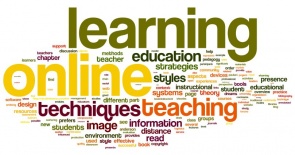VirtualMV/Digital Learning Technologies/Pedagogies
| Digital Learning Technologies | ||
|---|---|---|
| Pedagogies | Approaches | Course Design Guidelines | Instructional Design Models | Instructional Design Models Activity | |
Instructional design is the process of structuring learning content and activities during the process of course design, in a way that maximises the effectiveness of the learning and supports the students. Instructional designers work with subject matter experts to identify what students need to learn, shape the content and activities to match learning objectives and create multimedia to support the learning. Instructional designers need to be aware of learning theories and pedagogies as well as being adept in the use of a wide range of educational design and development tools.
During this weeks interactive tutorial we will look at instructional design models and apply one of these models (or a combination of) to plan a learning experience.
This weeks practical session will be devoted to completing the design and evaluating your planned learning activity.
Presentation from class 31 March 2014
- Brainstorm activity What happens in a face to face class?
Overview
Many of us would probably agree that the best way of learning often comes from the experiential way of learning, and learning should be fun for students as well as teachers. I would like to have a discussion with you on what are the interesting or experiential way of "teaching" or "facilitating" the learning of learning theory for example:
- behaviorism of way of learning
- cognitive way of learning
- constructivism of way of learning
- other way of learning like service based of learning
- collaboration way of learning
- inquiry based learning
Steve Wheeler of the University of Plymouth explores the concept of new learning forms that don’t simply place old forms on new digital platforms, but reconsider those forms.Key among the ideas given is personalized learning via the Just in time, Just enough, Just for me admonishment, a vision nearly impossible without a fully engaged community, smart application of technology, or both.
- eLearning 3.0 Characteristics ( http://edudemic.com/2012/05/new-pedagogies-for-the-digital-age/ )
- Distributed Learning
- Enhanced Mobile Technology
- Collaborative Intelligent Filtering
- 3D Visualization and Interaction
Resources
Learning Theories
- 2014 Theories of Learning - Infographic
- 2013 Learning theory map (Retrieved 2013) - A amazing map showing a large range of Learning Theories with key concepts, learning paradigms, theorists and scientific disciplines.
- Te Kete Ipurangi - The online knowledge basket - is a NZ MOE initiative that provides a great selection of resources and information for educators. Amongst the downloadable resources is a quick overview of Learning Theories.
- This document covers the basic theories as mentioned in the list above.
Course Design/Instructional Design
- Carpe Diem (Professor Gilly Salmon, Swineburne University, Australia)
- A five stage model
- 1. Access & Motivation
- 2. Socialisation
- 3. Information exchange
- 4. Knowledge Construction
- 5. Development
- Creative Commons handbook for Carpe Diem design A workbook to facilitate the process
- [E-tivities: The Key to Active Online Learning http://www.atimod.com/book/26/e-tivities-second-edition] Note the page contains a description of the various processes and resources (click show more)
- A five stage model
- Carpe Diem (Professor Gilly Salmon, Swineburne University, Australia)
- Infographic: What Does It Take to Create Effective e-learning?
Project Management
- Project Management for Instructional Designers An Open Text book includes videos from Instructional designers
- http://akoaotearoa.ac.nz/community/ldnet/forum/otara-course-design-process-getting-some-good-press-moodleorg
Pedagogy in Technology for Learning
- HYBRID PEDAGOGY:A Digital Journal of Learning, Teaching, and Technology. http://www.hybridpedagogy.com/Journal/files/tag-jesse-stommel.html
- Interesting use of a Blog to run an online Journal.
- Attwell, G. & Hughes, J. (2010) Pedagogic Approaches to Using Technology for Learning - Literature Review
- Keller (2006) Attention, Relevance, Confidence, Satisfaction (ARCS) model
- Keller, J. M. (2006). What is motivational design? ARCS Model website. Retrieved from http://www.arcsmodel.com/pdf/Motivational%20Design%20Rev%20060620.pdf
- Huett, J., Moller, L., Young, J., Bray, M., & Huett, K. (2008). Supporting the Distant Student: The Effect of ARCS-Based Strategies on Confidence and Performance. Quarterly Review Of Distance Education, 9(2), 113-126.
- 2013: Flipped classroom research (3:15 min)
- HYBRID PEDAGOGY:A Digital Journal of Learning, Teaching, and Technology. http://www.hybridpedagogy.com/Journal/files/tag-jesse-stommel.html
Blended Learning resources
Learning in Virtual Environments
- Learning in Virtual Worlds - Free Download
- Three-dimensional (3D) immersive virtual worlds have been touted as being capable of facilitating highly interactive, engaging, multimodal learning experiences. Much of the evidence gathered to support these claims has been anecdotal but the potential that these environments hold to solve traditional problems in online and technology-mediated education—primarily learner isolation and student disengagement—has resulted in considerable investments in virtual world platforms like Second Life, OpenSimulator, and Open Wonderland by both professors and institutions.
- In this authoritative collection, a team of international experts outline the emerging trends and developments in the use of 3D virtual worlds for teaching and learning.
- Free PDF download available at: http://www.aupress.ca/index.php/books/120254
- Learning in Virtual Worlds - Free Download
Tools
- Echo360 ( http://www.echo360.com )- Active Learning support system
- Lecture capture, Instructional content management system, quizzes, polls, discussion forum plus analytics.
 References
References
|
virtualMV | Superquick wiki guide | Please give me some feedback |
VirtualMV/Digital Learning Technologies/Pedagogies. (2025). In WikiEducator/VirtualMV wiki. Retrieved January 29, 2025, from http:https://wikieducator.org/VirtualMV/Digital_Learning_Technologies/Pedagogies (zotero)
|
